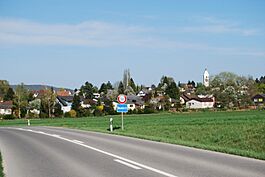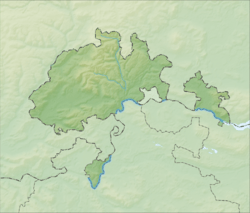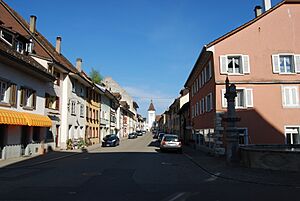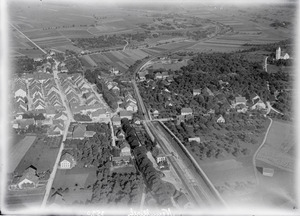Neunkirch facts for kids
Quick facts for kids
Neunkirch
|
||
|---|---|---|
 |
||
|
||
| Country | Switzerland | |
| Canton | Schaffhausen | |
| District | n.a. | |
| Area | ||
| • Total | 17.91 km2 (6.92 sq mi) | |
| Elevation
(Vor em obere Toor)
|
429 m (1,407 ft) | |
| Population
(Dec 2020 )
|
||
| • Total | 2,404 | |
| • Density | 134.23/km2 (347.65/sq mi) | |
| Demonym(s) | German: Neunkirchner(in) | |
| Postal code |
8213
|
|
| Surrounded by | Gächlingen, Guntmadingen, Hallau, Jestetten (DE-BW), Löhningen, Oberhallau, Siblingen, Wilchingen | |
Neunkirch is a small, historic town in Switzerland. It is also a municipality in the canton of Schaffhausen. The town sits south of the Lange Rande, which is a part of the Randen mountains. These mountains are about 900 meters (2,950 feet) high.
Contents
What's in a Name?
Neunkirch was first written about in the year 850. Back then, it was called Niuchilchun. This Old High German name means "new church." Over the years, the name changed a few times. Some older versions include Nuinchilchen, Niuchilchen, and Nüwenkilch. In the 1600s, people sometimes called it Nükilch or Nünkilch.
The name finally became Neunkirch to avoid confusion. The town belonged to the Bishopric of Constance, which already had another town named Niuchilchun (now Neukirch an der Thur). To tell them apart, the names were made different.
A Look at History
Neunkirch was first mentioned in a special document called a deed of gift. This document was for the Rheinau Abbey. It was dated Sunday, September 21, during the time of Louis the German. The exact year wasn't written down. However, experts figured out that September 21 was a Sunday in 850, 861, 867, and 872. In 1901, a group decided that the year 850 would be the official first mention of Neunkirch.
The original document no longer exists, but there is a copy in the public records office in Zürich.
Around 1150, we know that the bishop of Konstanz owned the church and a house in Neunkirch. By 1260, the bishop bought most of the land in Neunkirch. He also gained control over the town's laws and justice system.
Towards the end of the 1200s, Neunkirch was destroyed. This might have happened because of a war or a big fire. After this, the bishop rebuilt Neunkirch with a special plan. The town was designed as a rectangle with four straight streets. This geometric shape can still be seen today. The houses were protected by two walls with an open space between them. There was also a ditch, partly filled with water, in front of the outer wall.
Neunkirch belonged to the Bishopric of Constance for 250 years. Then, in 1525, the bishop sold his rights to the town's laws and justice to Schaffhausen. He sold them for 8,500 guilders, which was a lot of money back then.
Town Symbol: The Coat of Arms
The coat of arms for Neunkirch shows a silver church with a red roof on a blue background. This church symbol directly relates to the town's name, Neunkirch, which means "New Church."
Where is Neunkirch?
Neunkirch covers an area of about 17.9 square kilometers (6.9 square miles). A large part of this land, about 47.5%, is used for farming. Forests cover 45% of the area. About 6.8% of the land has buildings or roads. The remaining small part (0.6%) is made up of rivers or lakes.
Getting Around
The town has its own train station, called Neunkirch. It is located on the High Rhine Railway line.
People of Neunkirch
As of 2008, Neunkirch had a population of 1,861 people. About 14.3% of these residents were from other countries. Many of the foreign residents were from Germany (37.6%), Italy (17.4%), or Macedonia (16.7%).
Over the ten years before 2008, the town's population grew by about 3.1%. Most people in Neunkirch speak German (94.9%). Italian is the second most common language (2.1%).
In 2008, children and teenagers (ages 0-19) made up 25% of the population. Adults (ages 20-64) were 61.6%, and seniors (over 64) were 13.4%.
Most people in Switzerland are well-educated. In Neunkirch, about 79.8% of adults (ages 25-64) have finished high school or gone on to higher education like university.
In 2000, about 20.3% of the people belonged to the Roman Catholic Church. A larger group, 63.4%, belonged to the Swiss Reformed Church.
Here's how the population has changed over time:
| Year | Population |
|---|---|
| about 1300 | around 170 |
| 1530 | 460 (92 houses) |
| 1798/99 | 1,087 (140 houses) |
| 1850 | 1,640 |
| 1900 | 1,206 |
| 1950 | 1,217 |
| 2000 | 1,722 |
How People Make a Living
In 2007, Neunkirch had a low unemployment rate of 1.6%.
In 2005, there were 51 people working in farming. There were also 19 businesses related to farming. In the manufacturing sector, 321 people were employed, with 30 businesses. The service sector employed 313 people, with 56 businesses.
In 2008, 76.8% of the working population had full-time jobs. About 23.2% worked part-time. There were 682 residents who had jobs. Women made up 31.5% of the workforce.
In 2000, 252 residents worked within Neunkirch. However, 538 residents traveled outside Neunkirch for their jobs. Also, 306 people came into Neunkirch to work.
As of 2008, Neunkirch had 2 restaurants and 1 hotel with 14 beds. The hotel and restaurant business employed 9 people.
Important Historic Sites
The old city of Neunkirch, built in the Middle Ages and Early modern period, along with its city walls, is considered a very important heritage site in Switzerland.
The town was planned and built by the Bishop of Constance in the late 1200s. The old city has a rectangular shape with a main street going east-west and four smaller streets running next to it. Much of the original design is still there. Some new features were added in the 1500s and 1600s, like Renaissance styles. Only parts of the old city wall remain, but they include the large Obertor tower.
Famous People from Neunkirch
- Johannes von Müller (1752 in Neunkirch – 1809), a famous Swiss historian.
- Berta Rahm (1910 – 1998 in Neunkirch), a Swiss architect, writer, publisher, and activist for women's rights.
- Erika Forster-Vannini (born 1944), a Swiss politician who was the president of the Swiss Council of States in 2009/2010. She is a citizen of Neunkirch.
- Aurora Zeka (born 2003 in Neunkirch), a Swiss-Albanian singer.
See also
 In Spanish: Neunkirch para niños
In Spanish: Neunkirch para niños
 | Janet Taylor Pickett |
 | Synthia Saint James |
 | Howardena Pindell |
 | Faith Ringgold |






